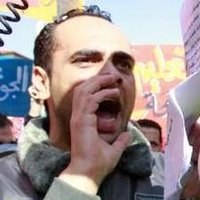![]()
Tue, Feb 12, 2013 | RubinReports | By Barry Rubin

President Obama continually tells us that his foreign policy is supportive of democracy and human rights, and that people all around the world love him for it. But the truth is that you’ll not find a single anti-Islamist Egyptian, Arab, Iranian, or Turk who thinks that way.
In giving his State of the Union speech, President Barack Obama will presumably brag about his greatest supposed achievement in the Middle East: Support for democracy and human rights.
But consider this amazing fact. Exactly two years ago there were massive demonstrations in Egypt against the Mubarak regime, which was a U.S. ally. Today there are massive demonstrations in Egypt against the Mursi, Muslim Brotherhood regime, which hates the United States and opposes its interests. The number of demonstrators killed by Mursi’s regime is approaching that of those who died during the anti-Mubarak revolt (an estimated 500 compared to 800 plus).
Yet what a difference in U.S. policy! Two years ago the Obama Administration found this repression to be unacceptable. It demanded Mubarak’s immediate resignation and spoke of human rights and democratic norms. Today we hear none of that. On the contrary, the Mursi regime is praised by the White House and advanced arms are given as presents to it without delay.
So it isn’t surprising that Bahieddin Hassan, director of the Cairo Institute for Human Rights Studies, has written an open letter to President Barack Obama. While many (most?) Americans think their country under the Obama administration has been supporting democracy and human rights in the Muslim-majority Middle East countries the people who live in those places know better.
In Iran, the U.S. government ignored the democratic opposition as it was repressed and the same was true in Syria until the civil war in which, amazing as it may seem, that same government has backed particularly the anti-democratic Islamist elements in the opposition. In the Gaza Strip, the U.S. policy has helped protect the Hamas regime, while in Egypt and Tunisia it lifted not one finger to help the moderates but enthusiastically endorses the Muslim Brotherhood. Islamist-ruled Turkey, whose government, has campaigned to limit democratic and human rights is repeatedly cited by Obama as a role model.
Some of these regimes have been elected but that has not stopped them from being repressive and seeking to create a situation in which they can never be voted out of office.
Arab, Iranian, and Turkish democrats are thus angry at the Obama Administration, feeling it is helping their enemies. But one would never know this to listen to the mainstream mass media, academia, and the political debate in America.
And so Hassan has written an open letter, published in al-Ahram, beginning with reminding Obama that he once visited the White House as part of a group of human rights’ activists. Hassan now writes that after he criticized Obama’s policy:
“Jokingly, you noted that despite being a guest in the White House, I was audacious enough to criticize the president in his presence. I responded that the act required no courage at all in light of what happens when we try to criticize Arab presidents back home, at which the hall erupted in laughter.”
Hassan is very anti-Israel and praises Obama’s “commendable human rights advisor Samantha Power” who talked a great deal once about Palestinian and Libyan rights but hasn’t been heard from on this issue regarding countries where the Islamists are on the offensive.
He continues:
“Egyptian young people continue to live in frustration due to the deteriorating economic situation and the repeated failure of political processes to represent their demands, despite the sacrifices that they have made for the sake of the revolution and transition to democracy.”
Obama has spoken a great deal of an alleged American past of bullying and imperialist behavior in the Middle East and other places which largely consisted of supporting local dictatorships because they benefited U.S. interests. Yet he is indifferent to the fact that as president he has supported local dictatorships without even the rationale of them being good for U.S. interests. In fact, they are both repressive and opposed to U.S. interests.
Hassan writes,
“Since December, the palace environs have witnessed the torture of demonstrators by members of the president’s party, the dragging and beating of protesters by security forces in scenes broadcast around the world, and assassinations.
“Two prominent cases are those of opposition journalist Mohamed Al-Husseini Abu Deif, who was shot in the head 12 December in front of the [presidential] palace, and that of Amr Saad, 19, who was also shot in the head in front of the palace in the beginning of February.
“This violence has also been seen in Tahrir Square. On 20 November, 17-year-old Gaber “Jika” Salah, the administrator of the Together against the Muslim Brothers Facebook page, was shot in the head with a shotgun. On 31 December, 20-year-old Mohammad Samir, a member of the 6 April Movement [the group that was lauded in America when it revolted against President Husni Mubarak but is now largely ignored when it is battling the Muslim Brotherhood regime], was shot in the head with a shotgun and entered a coma for several days before it finally became clear that he would survive.”
According to multiple testimonies, Hassan continues, rape is now being used as a strategy to break up demonstrations as female protesters are seized and taken to other locations for this purpose. These are organized attacks and bear every mark of being organized “to break the political will of the victims” rather than to satisfy lusts.
Hassan concludes:
“Mr. President…over recent months, statements by your administration have similarly failed to address violations and have even blamed protesters and victims for violence committed in the context of demonstrations. Indeed, the stances of your administration have given political cover to the current authoritarian regime in Egypt and allowed it to fearlessly implement undemocratic policies and commit numerous acts of repression.”
He then admirably dissects the true implications of the current U.S. government’s statements on Egypt:
“Statements that ‘Egypt is witnessing a genuine and broad-based process of democratization’ have covered over and indeed legitimized the undemocratic processes by which the Constituent Assembly passed the new Constitution….
“Calls for ‘the opposition [to] remain non-violent’ and for ‘the government and security forces [to] exercise self-restraint in the face of protester violence’ have allowed the police and the current Egyptian administration to shirk their responsibilities to secure demonstrations and to respond to the demands of the Egyptian people, and have allowed them to place the blame for violence and instability on protesters themselves.
“Urging ‘the opposition [to] engage in a national dialogue without preconditions’” is meaningless since, “these ‘dialogues’ seldom result in anything more concrete than a photo-op with the president.”
And then he concludes:
“Is it a coincidence that the statements issued by your administration reflect the same political rhetoric used by the new authoritarian regime in Egypt?”
No, every U.S. government has supported dictatorships abroad. President Franklin Roosevelt had to align with Stalin’s USSR to defeat Nazi Germany. During the Cold War, American presidents backed dictatorships in Latin America, South Vietnam, and other parts of the world to defeat Communism. The merits of these policies can be assessed on a case by case basis. Could this be justified by national security needs? Was there a better alternative which combined a more pro-democratic, pro-human rights’ approach with legitimate American interests?
But what do you call it when the U.S. government supports dictatorships to defeat…what exactly? Backing Sunni Islamists doesn’t defeat Islamism, and if they act against al-Qaida in their own interests they ally themselves with Salafists whose views are almost identical to those of al-Qaida. Indeed, in Syria, U.S. backed opposition groups unanimously defended the local al-Qaida affiliate from an American attempt to isolate it.
Yet perhaps, as is often said in the United States, Obama really has no influence in Egypt, Syria, or other such places. That’s not what the local people think. Hassan refers to,
“The world’s superpower — the one most able to have a positive or negative impact on policies in Egypt and the region, not to mention the biggest donor and material supporter of the Egyptian regime for the past 35 years….”
All Hassan requests is that U.S. officials stop making statements of the above sort which give verbal backing to the Brotherhood regime and are used by it to justify its own behavior and intimidate the opposition. (Give up, even the Americans support us and won’t help you!)
Americans themselves should expect a lot more from their government.
PS: I can’t help but remember a July 2009 open letter from Central European leaders asking Obama to help them against Russian ambitions under Putin. Despite being endorsed by virtually all of the great heroes of the democratic battle against the Soviet bloc, that letter was also ignored. We are continually told that Obama’s policy has been supportive of democracy and human rights, and that people all around the world love him for it. While I know that polls can be cited–sometimes misleadingly–I have never met a single anti-Islamist Arab, Iranian, or Turk who thought that way. Come to think of it, the same applies to Central Europeans, Chinese, and a number of other nationalities.
Barry Rubin is director of the Global Research in International Affairs (GLORIA) Center and editor of the Middle East Review of International Affairs (MERIA) Journal. His latest book, “Israel: An Introduction“, has just been published by Yale University Press. Other recent books include “The Israel-Arab Reader” (seventh edition), “The Long War for Freedom: The Arab Struggle for Democracy in the Middle East” (Wiley), and “The Truth About Syria” (Palgrave-Macmillan). The website of the GLORIA Center and of his blog, Rubin Reports. His original articles are published at PJMedia.



 RSS
RSS










Latest Comments
Hello Mike, Thank you for your positive feedback to the article. I felt there wasn’t too much critical analysis of ...
Thanks for this considered and well constructed article. A follow up article on the manner in which the editorial contro...
THE CLUELESSNESS OF CLAIMING THAT OBAMA'S MIDDLE EAST POLICIES WERE A FAILURE CANNOT BE FURTHER FROM THE TRUTH, WHAT THE...
As long as Obama is the president of the usa do not trust the us government......
Thank you for an good read....